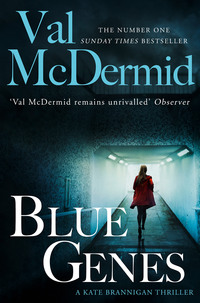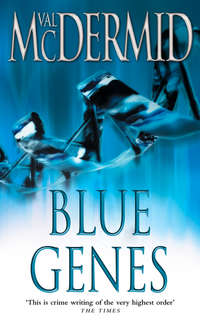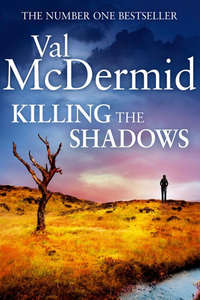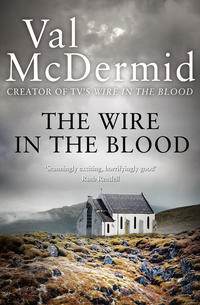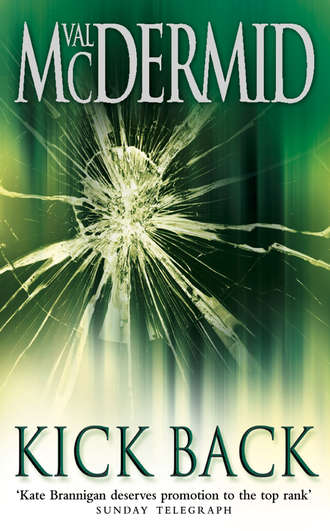
Полная версия
Kick Back
I wandered through to the outer office to give Shelley the new-client form and the cash, for banking. To my surprise, Ted Barlow was still there, standing awkwardly in front of Shelley’s desk like a kid who’s hung behind after class to talk to the teacher he has a crush on. As I entered, Shelley looked flustered and quickly said, ‘I’m sure Kate will have no trouble following these directions, Mr Barlow.’
‘Right, well, I’ll be off then. I’ll be seeing you later, Miss Brannigan.’
‘Kate,’ I corrected automatically. Miss Brannigan makes me feel like my spinster great aunt. She’s not one of those indomitable old biddies with razor-sharp minds that we all want to be when we’re old. She’s a selfish, hypochondriacal, demanding old manipulator and I have this superstitious fear that if I let enough people call me Miss Brannigan, it might rub off on me.
‘Kate,’ he acknowledged nervously. ‘Thank you very much, both of you.’ He backed through the door. Shelley was head down, fingers flying over the keyboard, before the door was even halfway closed.
‘Amazing how long it takes to give a set of directions,’ I said sweetly, dropping the form in her in-tray.
‘I was just sympathizing with the man,’ Shelley replied mildly. It’s not always easy to tell with her coffee-coloured skin, but I’d swear she was blushing.
‘Very commendable, too. There’s a grand in this envelope. Can you pop down to the bank with it? I’d rather not leave it in the safe.’
‘You do right. You’d only spend it,’ Shelley retorted, getting her own back. I poked my tongue out at her and returned to my own office. I picked up the phone again. This time, I rang Josh Gilbert. Josh is a partner in a financial services company. They specialize in providing advice and information to the kind of people who are so paranoid about ending up as impoverished senior citizens that they cheerfully do without while they’re young enough to enjoy it, just so they can sit back in comfort in their old age, muttering, ‘If I had my youth again, I could be waterskiing now …’ Josh persuades them to settle their shekels in the bosoms of insurance companies and unit trusts, then sits back planning for his own retirement on the fat commissions he’s just earned. Only difference is, Josh expects his retirement to begin at forty. He’s thirty-six now, and tells me he’s well on target. I hate him.
Of course, he was with a client. But I’d deliberately made my call at ten minutes to the hour. I figured that way he’d be able to call me back between appointments. Three minutes later, I was talking to him. I briefly outlined Ted Barlow’s problem. Josh said, ‘Mmm,’ a lot. Eventually, he said, ‘I’ll check your guy out. And I’ll do some asking around, no names, no pack drill. OK?’
‘Great. When can we get together on this?’
Over the phone, I could hear the sound of Josh turning the pages in his diary. ‘You hit me on a bad week,’ he said. ‘I suppose you need this stuff yesterday?’
‘Afraid so. Sorry.’
He sucked his breath in over his teeth, the way plumbers are trained to do when they look at your central-heating system. ‘Today’s Tuesday. I’m snowed under today, but I can get to it tomorrow,’ he muttered, half to himself. ‘But my time’s backed up solid Thursday, Friday I’m in London … Listen, can you do breakfast Thursday? I meant it when I said it was a bad week.’
I took a deep breath. I’m never at my best first thing, but business is business. ‘Thursday breakfast is fine,’ I lied. ‘Where would you like?’
‘You choose, it’s your money,’ Josh replied.
We settled on the Portland at seven-thirty. They have this team of obliging hall porters who park your car for you, which in my opinion is a major advantage at that time of the morning. I checked my watch again. I didn’t have time enough to develop and print my surveillance films. Instead, I settled for opening a file on Ted Barlow in my database.
Colonial Conservatories occupied the last unit before the industrial estate gave way to a sewage farm. What really caught the eye was the conservatory he’d built on the front of the unit. It was about ten foot deep and ran the whole thirty-foot width of the building. It had a brick foundation, and was separated into four distinct sections by thin brick pillars. The first section was classic Victorian Crystal Palace style, complete with plastic replica finials on the roof. Next was the Country Diary of an Edwardian Lady school of conservatory, a riot of stained panels whose inaccuracies would give any botanist the screaming habdabs. Third in line was the Spartan conservatory. A bit like mine, in fact. Finally, there was the Last Days of the Raj look – windows forming arches in a plastic veneer that gave the appearance, from a considerable distance, of being mahogany. Just the place to sit on your rattan furniture and summon the punkah wallah to cool you down. You get a lot of that in South Manchester.
Inside the conservatory, I could see Colonial Conservatories’ offices. I sat in the car for a moment, taking in the set-up. Just inside the door was a C-shaped reception desk. Behind it, a woman was on the phone. She had a curly perm that looked like Charles I’s spare wig. Occasionally, she tapped a key on her word processor and gave the screen a bored stare before returning to her conversation. Over to one side, there were two small desks, each equipped with a phone and a pile of clutter. No one was at either desk. On the back wall, a door led into the main building. Over in the far corner, a small office had been divided off with glass partitions. Ted Barlow was standing in shirtsleeves in this office, his tie hanging loose and the top button of his shirt open, slowly working his way through the contents of a filing cabinet drawer. The rest of the reception was taken up with display panels.
I walked into the conservatory. The receptionist said brightly into the phone, ‘Hold the line, please.’ She flicked a switch then turned her radiance on me. ‘How may I help you?’ she asked in a little girl’s voice.
‘I have an appointment with Mr Barlow. My name’s Brannigan. Kate Brannigan.’
‘One moment, please.’ She ran a finger down the page of her open desk diary. Her nail extensions mesmerized me. Just how could she type with those claws? She looked up and caught my stare, then smiled knowingly. ‘Yes,’ she said. ‘I’ll just see if he’s ready for you.’ She picked up a phone and buzzed through. Ted looked round him in a distracted way, saw me, ignored the phone and rushed across the reception area.
‘Kate,’ he exclaimed. ‘Thanks for coming.’ The receptionist cast her eyes heavenwards. Clearly, in her view, the man had no idea how bosses are supposed to behave. ‘Now, what do you need to know?’
I steered him towards his office. I had no reason to suspect the receptionist of anything other than unrealistic aspirations, but it was too early in the investigation to trust anyone. ‘I need a list of addresses of all the conservatories you’ve fitted in the last six months where the customers have taken out remortgages to finance them. Do you keep track of that information?’
He nodded, then stopped abruptly just outside his office. He pointed to a display board that showed several houses with conservatories attached. The houses were roughly similar – medium-sized, mostly detached, modern, all obviously surrounded on every side by more of the same. Ted’s face looked genuinely mournful. ‘That one, that one and that one,’ he said. ‘I had photographs taken of them after we built them because we were just about to do a new brochure. And when I went back today, they just weren’t there any more.’
I felt a frisson of relief. The one nagging doubt I had had about Ted’s honesty was resolved. Nasty, suspicious person that I am, I’d been wondering if the conservatories had ever been there in the first place. Now I had some concrete evidence that they had been spirited away. ‘Can you give me the name of the photographer?’ I asked, caution winning over my desire to believe in Ted.
‘Yes, no problem. Listen, while I sort this stuff out for you, would you like me to get one of the lads to show you round the factory? See how we actually do the business?’
I declined politely. The construction of double-glazed conservatories wasn’t a gap in my knowledge I felt the need to plug. I settled for the entertaining spectacle of watching Ted wrestle with his filing system. I sat down in his chair and picked up a leaflet about the joys of conservatories. I had the feeling this might be a long job.
The deathless prose of Ted’s PR consultant stood no chance against the smartly dressed man who strode into the showroom, dumped a briefcase on one of the two small desks and walked into Ted’s office, grinning at me like we were old friends.
‘Hi,’ he said. ‘Jack McCafferty,’ he added, thrusting his hand out towards me. His handshake was firm and cool, just like the rest of the image he projected. His brown curly hair was cut close at the sides and longer on top, so he looked like a respectable version of Mick Hucknall. His eyes were blue and had the dull sheen of polished sodalite against the lightly tanned skin of his face. He wore an olive green double-breasted suit, a cream shirt and a burgundy silk tie. The ensemble looked about five hundred pounds’ worth to me. I felt quite underdressed in my terracotta linen suit and mustard cowl-necked sweater.
‘Kate, Jack’s one of my salesmen,’ Ted said.
‘Sales team,’ Jack put him right. From his air of amused patience, I gathered it was a regular correction. ‘And you are?’
‘Kate Brannigan,’ I said. ‘I’m an accountant. I’m putting together a package with Ted. Pleased to meet you, Jack.’
Ted looked astonished. Lying didn’t seem to be his strong suit. Luckily, he was standing behind Jack. He cleared his throat and handed me a bulky blue folder. ‘Here are the details you wanted, Kate,’ he said. ‘If there’s anything that’s not clear, just give me a call.’
‘OK, Ted.’ I nodded. I had one or two questions I wanted to ask him, but not ones that fitted my exciting new persona of accountant. ‘Nice to meet you, Jack.’
‘Nice. That’s a word. Not the one I would have used for meeting you, Kate,’ he replied, a suggestive lift to one eyebrow. As I walked back across the reception area and out to my car, I could feel his eyes on me. I felt pretty sure I wouldn’t like what he was thinking.
3
I pulled up half a mile down the road and had a quick look through the file. Most of the properties seemed to be over in Warrington, so I decided to leave them till morning. The light was already starting to fade, and by the time I’d driven over there, there would be nothing to see. However, there were half a dozen properties nearby where Ted had fitted conservatories. He’d already visited one of them and discovered that the conservatory had gone. On my way home, I decided I might as well take a quick look at the others. I pulled my A-Z out of the glove box and mapped out the most efficient route that included them all.
The first was at the head of a cul-de-sac in a nasty sixties estate, one of a pair of almost-detached houses, linked only by their garages in a bizarre Siamese twinning. I rang the bell, but there was no response, so I walked down the narrow path between the house and the fence to the back garden. Surprise, surprise. There was no conservatory. I studied the plan so I could work out exactly where it had been. Then I crouched down and scrutinized the brickwork on the back wall. I didn’t really expect to find anything, since I wasn’t at all sure what I should even be looking for. However, even my untrained eye noticed a line of faint markings on the wall. It looked like someone had given it a going over with a wire brush – enough to shift the surface grime and weathering, that was all.
Intrigued, I stood up and headed for the next destination. 6 Wiltshire Copse and 19 Amundsen Avenue were almost identical. And they were both minus conservatories. However, the next two remortgages I visited still had their conservatories firmly anchored to the houses. I trekked back to my car for the fifth time, deeply depressed after too much exposure to the kind of horrid little houses that give modern a bad name. I thought of my own home, a bungalow built only three years before, but constructed by a builder who didn’t feel the need to see how small a bedroom you could build before the human mind screams, ‘No!’ My lounge is generous, I don’t have to climb over anything to get in and out of bed and my second bedroom is big enough for me to use as an office, complete with sofa bed for unavoidable visitors. But most of these overgrown sheds looked as if they’d have been pressed to provide one decent-sized bedroom, never mind three.
The irony was that they were probably worth more than mine because they were situated on bijou developments in the suburbs. Whereas my little oasis, one of thirty ‘professional person’s dwellings’, was five minutes from every city centre amenity. The downside was that it was surrounded by the kind of inner-city housing they make earnest Channel 4 documentaries about. The locale had brought the price down far enough for me also to afford the necessary state-of-the-art alarm system.
I decided home was where I should head for. Darkness was falling, so I wouldn’t be able to continue my fascinating study of late-twentieth-century bricklaying. Besides, people were getting home from work and I was beginning to feel a little conspicuous. It was only a matter of time before some overzealous Neighbourhood Watch vigilante called the cops, an embarrassment I could well do without. I drove out of the opposite end of the estate to the one I’d come in by, and suddenly realized I was only a couple of streets away from Alexis’s house.
Alexis Lee is probably my best friend. She’s the crime reporter on the Manchester Evening Chronicle. I guess the fact that we’re both women who’ve broken into what is traditionally a male preserve helped build the bond between us. But apart from our common interest in things criminal, she’s also saved me more money than anyone else I know. I can think of at least a dozen times when she’s prevented me from making very costly mistakes in expensive dress shops. And, at the risk of making her sound like a stereotype, she’s got that wonderful, rich Liverpudlian sense of humour that can find the funny side in the blackest tragedy. I couldn’t think of anything that would cheer me up faster than a half-hour pit stop.
The earlier rain had turned the fallen leaves into a slick mush. As I braked gently to pull up outside Alexis’s, I swear my Vauxhall Nova went sideways. Cursing the Highways Department, I slithered round the car and on to the safer ground of the driveway. I grabbed at a post to steady myself, then realized with a shock that this particular post wasn’t a permanent fixture. It was supporting a For Sale sign. I was outraged. How dare they put the house on the market without consulting me? Time I found out what was going on here. I walked round to the back door, knocked and entered the kitchen.
Alexis’s girlfriend Chris is a partner in a firm of community architects, which is why their kitchen looks like a Gothic cathedral, complete with flagged floor and vaulted ceiling with beams like whales’ ribs. The plasterwork is stencilled with flower and fruit motifs, and there are plaster bas-relief bosses at regular intervals along the roof truss. It’s an amazing sight.
Instead of the Quasimodo I always half-expect, Alexis was sitting at the pitch-pine table, a mug of tea at her elbow, some kind of catalogue open in front of her. As I came in, she looked up and grinned. ‘Kate! Hey, good to see you, kid! Grab yourself a cuppa, the pot’s fresh,’ she said, waving at the multi-coloured knitted tea cosy by the kettle. I poured myself a mug of strong tea as Alexis asked, ‘What brings you round here? You been doing a job? Anything in it for me?’
‘Never mind that,’ I said firmly, dropping into a chair. ‘You trying to avoid me? What’s with the For Sale sign? You put the house on the market and you don’t tell me?’
‘Why? Were you thinking of buying it? Don’t! Don’t even let it cross your mind! There’s barely enough room for me and Chris, and we agree on what’s an acceptable degree of mess. You and Richard would kill within a week here,’ Alexis parried.
‘Don’t try to divert me,’ I said. ‘Richard and I are fine as we are. Next door neighbours is as close as I’m ever going to let it get.’
‘And how is your insignificant other?’ Alexis interrupted.
‘He sends you his love too.’ Alexis and the man I love have a relationship that seems to me to consist entirely of verbal abuse. In spite of appearances, however, I suspect they love each other dearly; once I actually came upon the two of them having a friendly drink together in a corner of the Chronicle’s local. They’d both looked extremely sheepish about it. ‘Now, about this For Sale board?’
‘It’s only been up a couple of days. It’s all been a bit of a rush. You remember Chris and I talking about how we wanted to buy a piece of land and build our own dream home?’
I nodded. I could more easily have forgotten my own name. ‘You’re planning on doing it as part of a self-build scheme; Chris is going to design the houses in exchange for other people giving you their labour, yes?’ They’d been talking about it for as long as I’d known them. With a lot of people, I’d have written it off as dreaming. But Alexis and Chris were serious. They’d spent hundreds of hours poring over books, plans and their own drawings till they’d come up with their ideal home. All they’d been waiting for was the right plot of land at the right price in the right location. ‘The land?’ I asked.
Alexis reached along the side of the table and pulled a drawer open. She tossed a packet of photographs at me. ‘Look at that, Kate. Isn’t it stunning? Isn’t it just brilliant?’ She pushed her unruly black hair out of her eyes and gazed expectantly at me.
I studied the pictures. The first half-dozen showed a selection of views of an area of rough moorland grass that had sheep grazing all over it. ‘That’s the land,’ Alexis enthused, unable to stay silent. I continued. The rest of the pictures were views of distant hills, woods and valleys. Not a Chinese takeaway in sight. ‘And those are the views. Amazing, isn’t it? That’s why I’m going through this.’ She waved the catalogue at me. I could see now it was a building supplies price list. Personally, I’d have preferred a night in with the phone book.
‘Where on earth is it?’ I asked. ‘It looks so … rural.’ That was the first word I could come up with that was truthful as well as sounding like I approved.
‘It’s really wild, isn’t it? It’s only three minutes away from the M66. It’s just above Ramsbottom. I can be in the office in twenty minutes outside rush hour, but it’s completely isolated from the hassle of city life.’
If that had been me, I’d have ended the sentence six words sooner. If you’re more than ten minutes away from a Marks & Spencer Food Hall (fifteen including legal parking), as far as I’m concerned, you’re outside the civilized world. ‘Right,’ I said. ‘That’s just what you wanted, isn’t it?’
‘Yeah, it’s the business. As soon as we saw it advertised, we called a meeting of the other people we’ll be building with, and we all went off to see it. We’ve agreed a price with the builder, but he wants a quick completion because someone else is interested. Or so he says, but if you ask me, he’s just on the make. Anyway, we’ve put down a deposit of five thousand pounds on each plot, and it’s looking good. So it’s time to sell this place and get our hands on the readies we’ll need to build the new house.’
‘But where are you going to live while you’re building?’ I asked.
‘Well, Kate, it’s funny you should mention that. We were wondering …’ I nearly panicked. Then I saw the smile twitching at the corner of her mouth. ‘We’re going to buy a caravan now, at the end of the season when it’s cheap, live in it over the winter and sell it in the spring. The house should be just about habitable by then,’ Alexis told me cheerfully. I couldn’t control the shiver that ran through me.
‘Well, any time you need a bath, you’re more than welcome,’ I said.
‘Thanks. I might just take you up on that, you being so handy for the office,’ she said.
I drained my mug and got to my feet. ‘I’ve got to run.’
‘Don’t tell me, you’re off on some Deep Throat surveillance,’ Alexis teased.
‘Wrong again. I can see why you just write about crime rather than detecting it. No, Richard and I are going ten-pin bowling.’ I said it quickly, but it didn’t get past her.
‘Tenpin bowling?’ Alexis spluttered. ‘Tenpin bowling? Shit, Brannigan, it’ll be snogging in the back row of the pictures next.’
I left her giggling to herself. All through history, the pioneers have been mocked by lesser minds. All you can do is rise above it.
There are probably worse ways to spend a wet Wednesday in Warrington than wandering round modern housing developments talking to the local inhabitants. If so, I haven’t discovered them. I got to the first address soon after nine, which wasn’t bad considering it had taken me twice as long as usual to get ready that morning because of the painful stiffness in my right shoulder. I’d forgotten you shouldn’t go tenpin bowling unless you’ve got the upper body fitness levels of an Olympic shot putter.
The first house was at the head of a cul-de-sac that spiralled round like a nautilus shell. I tried the doorbell of the neat semi, but got no response. I peered through the picture window into the lounge, which was furnished in spartan style, with no signs of current occupation. The clincher was the fact that there was no TV or video in sight. It looked as if my conservatory buyers had moved and were renting out their house. Most people who let their homes furnished tuck their expensive but highly portable electrical goods away into storage in case the letting agency don’t do their homework properly and let the house to people of less than sterling honesty. Strangely, a couple of the houses I’d visited the previous evening had had a similar air of absence.
Round the back, there was more evidence of the missing conservatory than in the others I’d seen, where the concrete bases they’d been built on had simply looked like unfinished patios. Here, there was a square of red glazed quarry tiles extending out beyond the patio doors. Round the edge of the square was a little wall, two bricks deep, except for a door-sized gap. And the walls showed the now familiar traces of the mortar that had attached the extension to the house.
I’d noticed a car parked in the drive of the other half of the semi, so I made my way back round to the front and rang the doorbell, which serenaded me with an electronic ‘Yellow Rose of Texas’. The woman who opened the door looked more like the Dandelion Clock of Cheshire. She had a halo of fluffy white hair that looked like it had been defying hairdressers for more than half a century. Grey-blue eyes loomed hazily through the thick lenses of gold-rimmed glasses as she sized me up. ‘Yes?’ she demanded.
‘I’m sorry to bother you,’ I lied. ‘But I was wondering if you could help me. I represent the company who sold next door their conservatory …’
Before I could complete my sentence, the woman cut in. ‘We don’t want a conservatory. And we’ve already got double glazing and a burglar alarm.’ The door started to close.
‘I’m not selling anything,’ I yelped, offended by her assumption. Great start to the day. Mistaken for a double-glazing canvasser. ‘I’m just trying to track down the people who used to live next door.’
She stopped with the door still open a crack. ‘You’re not selling anything?’
‘Cross my heart and hope to die. I just wanted to pick your brains, that’s all.’ I used the reassuring voice. The same one that usually works on guard dogs.
The door slowly opened again. I made a great show of consulting the file I was carrying in my bag. ‘It says here the conservatory was installed back in March.’
‘That would be about right,’ she interrupted. ‘It went up the week before Easter, and it was gone a week later. It just disappeared overnight.’ History had just been made. I’d dropped lucky at the first attempt.


